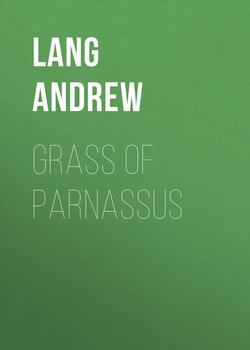Читать книгу Grass of Parnassus - Lang Andrew, May Kendall - Страница 1
ОглавлениеTO
E. M. S
Primâ dicta mihi, summâ dicenda Camenâ
The years will pass, and hearts will range,
You conquer Time, and Care, and Change.
Though Time doth still delight to shed
The dust on many a younger head;
Though Care, oft coming, hath the guile
From younger lips to steal the smile;
Though Change makes younger hearts wax cold,
And sells new loves for loves of old,
Time, Change, nor Care, hath learned the art
To fleck your hair, to chill your heart,
To touch your tresses with the snow,
To mar your mirth of long ago.
Change, Care, nor Time, while life endure,
Shall spoil our ancient friendship sure,
The love which flows from sacred springs,
In ‘old unhappy far-off things,’
From sympathies in grief and joy,
Through all the years of man and boy.
Therefore, to you, the rhymes I strung
When even this ‘brindled’ head was young
I bring, and later rhymes I bring
That flit upon as weak a wing,
But still for you, for yours, they sing!
Many of the verses and translations in this volume were published first in Ballads and Lyrics of Old France (1872). Though very sensible that they have the demerits of imitative and even of undergraduate rhyme, I print them again because people I like have liked them. The rest are of different dates, and lack (though doubtless they need) the excuse of having been written, like some of the earlier pieces, during College Lectures. I would gladly have added to this volume what other more or less serious rhymes I have written, but circumstances over which I have no control have bound them up with Ballades, and other toys of that sort.
It may be as well to repeat in prose, what has already been said in verse, that Grass of Parnassus, the pretty Autumn flower, grows in the marshes at the foot of the Muses’ Hill, and other hills, not at the top by any means.
Several of the versions from the Greek Anthology have been published in the Fortnightly Review, and the sonnet on Colonel Burnaby appeared in Punch. These, with pieces from other serials, are reprinted by the courteous permission of the Editors.
The verses that were published in Ballades and Lyrics, and in Ballads and Verses Vain (Charles Scribner’s Sons, New York), are marked in the contents with an asterisk.
